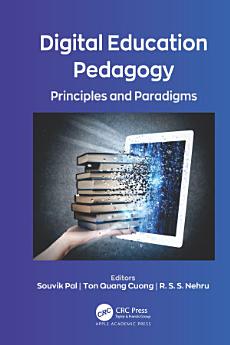Digital Education Pedagogy: Principles and Paradigms
આ ઇ-પુસ્તક વિશે
It is becoming increasingly important to develop adaptive, robust, scalable, and digital teaching-learning mechanisms in academics. This volume addresses this need by discussing the advancements in flipped and blended learning, student- and teacher-centric learning in technical institutes, critical digital pedagogies, and the complex analyses and collaborations with organizations outside the academy. This book also deals with protocols for educational and administrative policies, IoT-based teaching-learning methodology, teaching education and the process of assessment, testing and evaluation, integration of technology with digital education, and different case study-based approaches in digital teaching-learning methodology.
લેખક વિશે
Souvik Pal, PhD, is an Associate Professor in the Department of Computer Science and Engineering at Brainware University, Kolkata, India. He formerly worked as an Assistant Professor at the Nalanda Institute of Technology, Bhubaneswar, and the JIS College of Engineering, Kolkata, India. He has also worked as head of the Computer Science Department at Elitte College of Engineering, Kolkata. Dr. Pal has published several research papers in Scopus-indexed international journals and conferences and has edited several books. He is also the author of a book on cloud computing. He has served at many conferences as chair and keynote speaker, and he also has chaired international conference sessions and presented session talks internationally.
Ton Quang Cuong, PhD, is Dean of the Faculty of Educational Technology at the University of Education at Vietnam National University, Hanoi. Dr. Cuong has extensive teaching experience in teacher education, educational technology, and management skills. As the Head of the Department of Educational Technology, Learning Theories and Instructional Technology, he is responsible for the development of curricula, learning methodology and technology, and leadership and management instruction.
R. S. S. Nehru, PhD, is an Assistant Professor in the Department of Education at Sikkim University, Gangtok, Sikkim, India. Dr. Nehru has published books as the main and co-author and more than 30 edited book chapters related to education and educational technologies as well as several research papers in Scopus-indexed national and international journals and conferences. He is an editorial board member for two multidisciplinary international journals. Dr. Nehru has served at many conferences as chair, keynote speaker, co-chair, and resource person for national workshops on multidisciplinary research.




